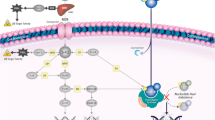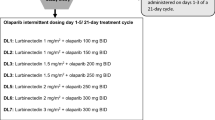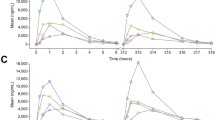Abstract
Purpose
OSI-7904L is a liposomal formulation of a potent thymidylate synthase (TS) inhibitor. This phase I study evaluated the safety, tolerability and pharmacokinetics (PK) of OSI-7904L administered in combination with oxaliplatin every 21 days in patients with advanced colorectal carcinoma.
Method
A 3+3 study design was utilized at predefined dose levels. Polymorphisms in the TS enhancer region and XPD enzyme were investigated as potential predictors of efficacy and toxicity.
Results
Fourteen patients received 76 cycles of treatment. At the highest dose level (OSI-7904L 9 mg/m2, oxaliplatin 130 mg/m2) investigated, one of nine patients experienced dose-limiting toxicity of grade 3 oral mucositis with cycle 1 and five further patients required dose reductions. The toxicity profile of stomatitis, diarrhea, nausea, fatigue, sensory neuropathy and skin rash was consistent with that expected for a TS inhibitor/oxaliplatin combination regimen. PK analysis showed high interpatient variability with no detectable interaction between OSI-7904L and oxaliplatin. Partial radiological responses were documented in two patients.
Conclusions
The recommended regimen for further investigation is OSI-7904L 9 mg/m2 and oxaliplatin 130 mg/m2.
Similar content being viewed by others
References
Colorectal Cancer Collaborative Group (2000) Palliative chemotherapy for advanced colorectal cancer: systematic review and meta-analysis. BMJ 321:531–535
Douillard JY, Cunningham D, Roth AD et al (2000) Irinotecan combined with fluorouracil alone as first-line treatment for metastatic colorectal cancer: a multi-centre randomized trial. Lancet 355:1041–1047
De Gramont A, Figer A, Seymour M et al (2000) Leucovorin and fluorouracil with or without oxaliplatin as first-line treatment for metastatic colorectal cancer. J Clin Oncol 18:2938–2947
Tournigand C, Andre T, Achille E et al (2004) FOLFIRI followed by FOLFOX6 or the reverse sequence in advanced colorectal cancer: a randomized GERCOR study. J Clin Oncol 22:229–237
Longley DB, Harkin DP, Johnston PG (2003) 5-Fluorouracil: mechanisms of action and clinical strategies. Nat Rev Cancer 3:330–338
De Gramont A, Bosset JF, Milan C et al (1997) Randomized trial comparing monthly low-dose leucovorin and fluorouracil bolus with bimonthly high-dose leucovorin and fluorouracil bolus plus continuous for advanced colorectal cancer: a French intergroup study. J Clin Oncol 15:808–815
Van Cutsem E, Twelves C, Cassidy J et al (2001) Oral capecitabine compared with intravenous fluorouracil plus leucovorin in patients with metastatic colorectal cancer. J Clin Oncol 19:4097–4106
Douillard JY, Hoff PM, Skillings JR et al (2002) Multicenter phase III study of uracil/ tegafur and oral leucovorin versus fluorouracil and leucovorin in patients with previously untreated metastatic colorectal cancer. J Clin Oncol 20:3605–3616
Desjardins J, Emerson DL, Colagiovanni DB, Abbott E, Brown EN, Drolet DW (2004) Pharmacokinetics, safety and efficacy of a liposome encapsulated thymidylate synthase inhibitor, OSI-7904L [(S)-2-[5-[1,2-dihydro-3-methyl-1-oxobenzo[f]quinazolin-9-yl)methyl]amino-1-oxo-2-isoindolynl]-glutaric acid] in mice. J Pharmacol Exp Ther 309:894–902
Beutel G, Glen H, Schöffski P et al (2005) Phase I study of OSI-7904L, a novel liposomal thymidylate synthase inhibitor in patients with refractory solid tumors. Clin Cancer Res 11:5487–5495
Winski S, Nilsson C, Brown E et al (2002) In vivo antitumor efficacy of liposomal OSI-7904L in human tumor xenografts. NCI-EORTC-AACR Molecular targets and cancer therapeutics meeting, 2002 Abstract 119
Pendyala L, Leichman CG, Clark K et al (2001) Oxaliplatin influences the intra-tumoral expression of γ-glutamylcysteine synthetase and thymidylate synthase genes in patients with esophagus cancer. Proc Am Soc Clin Oncol 20, 351a
Kawakami K, Omura K, Kanehira E et al (1999) Polymorphic tandem repeats in the thymidylate synthase gene is associated with its protein expression in human gastrointestinal cancers. Anticancer Res 19:3249–3252
Chen J, Hunter DJ, Stampfer MJ et al (2003) Polymorphism in the thymidylate synthase promoter enhancer region modifies risk and survival of colorectal cancer. Cancer Epidemiol Biomarkers Prev 12:958–962
Mandola MV, Stoehlmacher J, Muller-Weeks S et al (2003) A novel single nucleotide polymorphism within the 5′ tandem repeat polymorphism of the thymidylate synthase gene abolishes USF-1 binding and alters transcriptional activity. Cancer Res 63:2898–2904
Morganti M, Ciantelli M, Giglioni B et al (2005) Relationships between promoter polymorphisms in the thymidylate synthase gene and mRNA levels in colorectal cancers. Eur J Cancer 41:2176–2183
Gurubhagavatula S, Liu G, Park S et al (2004) XPD and XRCC1 genetic polymorphisms are prognostic factors in advanced non-small-cell lung cancer patients treated with platinum chemotherapy. J Clin Oncol 22:2594–2601
Spitz MR, Wu X, Wang Y et al (2001) Modulation of nucleotide excision repair capacity by XPD polymorphisms in lung cancer patients. Cancer Res 61:1354–1357
Stoehlmacher J, Park DJ, Zhang W et al (2004) A multivariate analysis of genomic polymorphisms: prediction of clinical outcome to 5-FU/oxaliplatin combination chemotherapy in refractory colorectal cancer. Br J Cancer 91:344–354
Cancer Therapy Evaluation Programme (2003) Common Terminology Criteria for Adverse Events, Version 3.0. DCTD, NCI, NIH, DHHS. December 12 2003. (http://www.ctep.cancer.gov/reporting/ctc_v3.0)
Therasse P, Arbuck SG, Eisenhauer EA et al (2000) New guidelines to evaluate the response to treatment in solid tumors. J Natl Cancer Inst 92:205–216
Falk SJ, Anthoney A, Eatock M et al (2006) Multicentre phase II pharmacokinetic and pharmacodynamic study of OSI-7904L in previously untreated patients with advanced gastric or gastroesophageal junction adenocarcinoma. Br J Cancer 95:450–456
Graham MA, Lockwood GF, Greenslade D et al (2000) Clinical pharmacokinetics of oxaliplatin: a critical review. Clin Cancer Res 6:1205–1218
Extra JM, Espie M, Calvo F et al (1990) Phase I study of oxaliplatin in patients with advanced cancer. Cancer Chemother Pharmacol 25:299–303
Maindrault-Goebel F, de Gramont A, Louvet C et al (2001) High-dose intensity oxaliplatin added to the simplified bimonthly leucovorin and 5-fluorouracil regimen as second-line therapy for metastatic colorectal cancer (FOLFOX 7). Eur J Cancer 37:1000–1005
Ford HER, Mitchell F, Cunningham D et al (2002) Patterns of elevation of plasma 2′-deoxyuridine, a surrogate marker of thymidylate synthase (TS) inhibition, after administration of two different schedules of 5-fluorouracil and the specific TS inhibitors raltitrexed (Tomudex) and ZD9331. Clin Cancer Res 8:103–109
Acknowledgments
The authors would like to thank Dr. D. W. Drolet for his assistance in the pharmacokinetic analyses.
Funding source
The study sponsor was OSI Pharmaceuticals Inc. Study design, data collection, interpretation and decision to submit the manuscript for publication were undertaken by the EORTC in conjunction with the authors.
Conflict of interest statement
J. Chick is an employee of OSI Pharmaceutical Inc. and hold share options in this company. None of the other authors have any conflict of interest.
Author information
Authors and Affiliations
Consortia
Corresponding author
Rights and permissions
About this article
Cite this article
Clamp, A.R., Schöffski, P., Valle, J.W. et al. A phase I and pharmacokinetic study of OSI-7904L, a liposomal thymidylate synthase inhibitor in combination with oxaliplatin in patients with advanced colorectal cancer. Cancer Chemother Pharmacol 61, 579–585 (2008). https://doi.org/10.1007/s00280-007-0509-5
Received:
Accepted:
Published:
Issue Date:
DOI: https://doi.org/10.1007/s00280-007-0509-5




